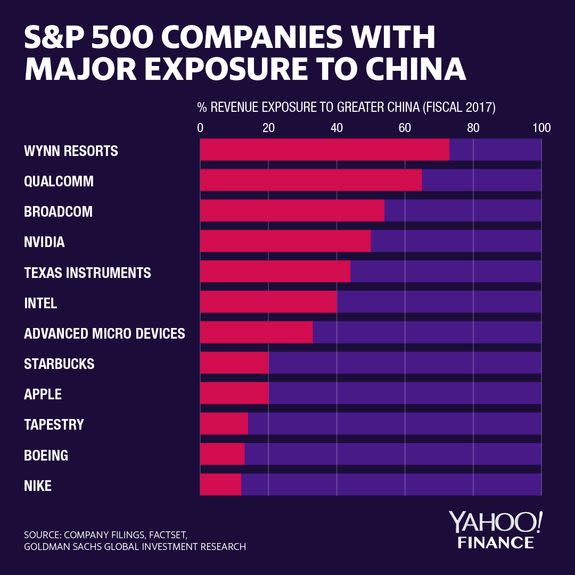The U.S. companies blaming China for their earnings misses
As China’s economy slows down, Corporate America is feeling the pinch.
This earnings season hasn’t been a great one for some companies, from industrial giant Caterpillar (CAT) to tech firm Nvidia (NVDA). Many used the same reason to explain the shortfall to investors — China.
Caught in the trade war with the U.S. and Beijing’s crackdown on a debt-fueled corporate spending spree, the fastest-growing market for many American companies is no longer expanding at full speed. China’s GDP grew 6.6% in 2018, the slowest pace since 1990. While President Donald Trump applauded the deceleration and sees it as a leverage in trade negotiations, it has forced some U.S. companies to lower revenue guidance.

But analysts also suggest the macro conditions in China shouldn’t be held responsible for all of companies’ problems. Loup Ventures Managing Partner Gene Munster, for example, said China is only two-thirds of Apple’s problems, with the other one-third being iPhone’s high price point.
Here is a list of companies that blame China for disappointing earnings results. [This list will be updated as more companies report.]
3M (MMM)
The U.S. manufacturer reported sluggish sales in its automotive and electronics business led by weak customer demand in China, which has deteriorated since November. It also said the improvement of air quality in the country once notoriously known for pollution has affected the market.
“Asia Pacific declined 5% as we continued to experience lower year-on-year demand for our consumer respiratory solutions, particularly in China/Hong Kong due to improved air quality,” 3M CFO Nicholas Gangestad said on Tuesday.
Intel (INTC)
The chip giant reported quarterly revenue and outlook fell short of Wall Street expectations last week, citing growing concern about trade and China’s economic issues.
“Fourth quarter revenue of $18.7 billion was up 9% but short of our expectations as a result of a dramatically weakening modem demand, lower overall growth in China, cloud service providers absorbing capacity and a weakening NAND pricing environment.”
Back in October, Intel’s management offered a mixed outlook but admitted during its January call that, “since that time, trade and macro concerns, especially in China, have intensified.”
Caterpillar (CAT)
The heavy equipment company reported its biggest earnings miss in 10 years on Monday and issued a lower-than-expected earnings outlook for 2019.
Seen as a bellwether for the economy, Caterpillar had two years of “significant growth” in China since 2016. But it told investors on Monday that it’s forecasting the overall China market to be roughly flat in 2019. China now represents about 5% to 10% of total sales and revenues.
“Asia Pacific sales were down 4% or $64 million. The sales decline was driven by lower demand in China, partially offset by higher demand in a few other countries in the region,” according to Caterpillar fillings Monday.
Nvidia (NVDA)
The chipmaker, which pockets 50% of its revenue from Greater China, has lowered its fourth-quarter revenue outlook on Monday, citing “deteriorating macroeconomic conditions, particularly in China”.”
“As we worked through Q4, the global economy decelerated sharply, particularly in China, affecting consumer demand for NVIDIA gaming GPUs,” Nvidia told investors.
Apple (APPL)
The iPhone maker is one of the first multinationals that sounded the alarm on the slowing Chinese consumer market. In a bombshell letter to investors in early January, Apple CEO Tim Cook attributed the lag of new iPhone model sales to the slowdown of China’s economy.
“We believe the economic environment in China has been further impacted by rising trade tensions with the United States,” he wrote. “As the climate of mounting uncertainty weighed on financial markets, the effects appeared to reach consumers as well, with traffic to our retail stores and our channel partners in China declining as the quarter progressed.”
Tuesday’s earnings confirmed Apple’s disappointing quarter in China, its second-largest market. Sales were down by $4 billion or 27% from last year due to declines across iPhone, Mac and iPad. During the earnings call, Cook reiterated the weak macro conditions in China, which is “significantly more severe than we originally foresaw”.
Since December, Apple has been offering trade-in promotions and cutting prices for iPhone XR. Cook also said the service revenue in China is making records. “Macroeconomic factors will come and go, but we see great upside in continuing to focus on the things that we can control,” he said.
Krystal Hu covers technology and trade for Yahoo Finance. Follow her on Twitter.
Read more:
What Tim Cook left out about China in Apple's revenue guidance
Apple cuts iPhone XR price for partner sellers in China
